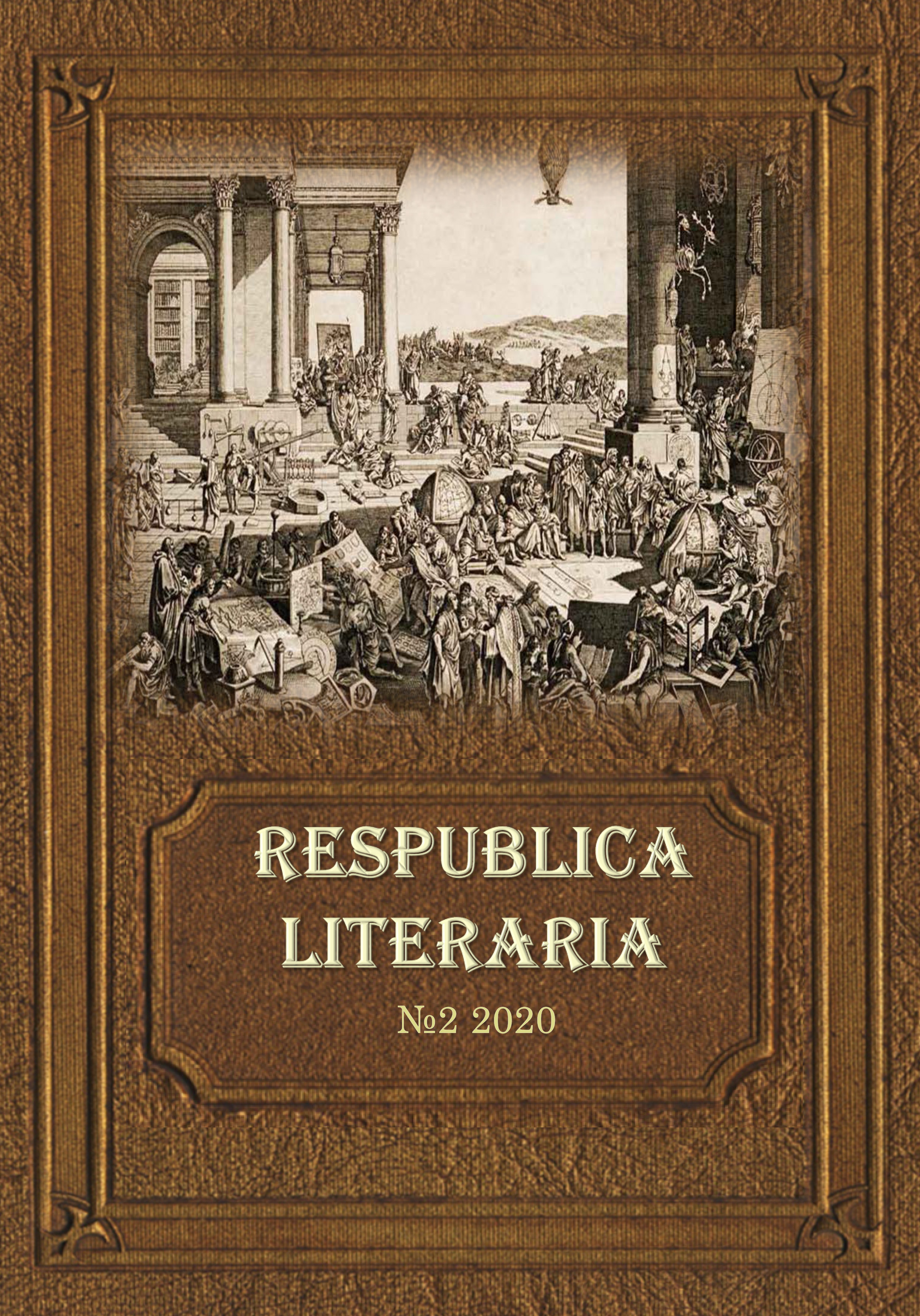Functioning of the P. Ricoeur's mimetic circle in the various narrative representations of the past
DOI:
https://doi.org/10.47850/RL.2020.1.2.5-19Keywords:
Keywords: P. Ricoeur, mimetic circle, narrative, representation of the past, Stalin myth.Abstract
Abstract. Scholar’s and mythological historical narratives coexist independently, but now they have been increasingly confused. To find ways to compare them and highlight the properties which distinguish them, we turn to P. Ricoeur's concept of triple mimesis. Narratives are cognitive tools, so they are almost omnipresent. Since there is nothing in the narrative that would distinguish one type from another, it is necessary to pay attention to how they function, to the ways of representing reality that use different types of narratives. For this, the article uses the concept of P. Ricoeur's mimetic circle, which takes into account not only the narrative dimension itself, but also its “depth”, the degree of approximation to reality.
References
Аникина, А. Б. (2015). Дискурс истории: возможно ли заменить истинность на эффективность? Вестник НГУ. Серия: Философия. Т. 13. Вып. 1. С. 100-107.
Anikina, A. B. (2015). The Historical discourse: truth or effectiveness? Vestnik of Novosibirsk State University. Series: Philosophy. Vol. 13. no. 1. pp. 100-107. (In Russ.)
Аникина, А. Б. (2016). Логика исторического процесса: ее конструирование и саморазрушение. Сибирский философский журнал. 2016. №. 1. С. 83-93.
Anikina, A. B. (2016). The logic of the historical process: its construction and autodestruction. Siberian Journal of Philosophy. no. 1. pp. 83-93. (In Russ.)
Анкерсмит, Ф. (2003). История и тропология: взлет и падение метафоры. М.: Прогресс-Традиция. 496 с.
Ankersmit, F. (2003). History and Tropology. The Rise and Fall of Metaphor. Moscow. 496 p. (In Russ.)
Ауэрбах, Э. (1976). Мимесис. Изображение действительности в западноевропейской культуре. М. 556 с.
Auerbach, E. (1976). Mimesis. The Representation of Reality in Western Literature. Moscow. 556 p. (In Russ.)
Барышникова, Д. (2014). Беспорядок дискурса (обзор работ по «неестественной» нарратологии). Новое литературное обозрение. № 6 (130). C. 325-332.
Baryshnikova, D. (2014). Disorder of Discourse (a review of works on “unnatural” narratology). New Literary Review. no. 6(130). pp. 325- 332. (In Russ.)
Брокмейер, Й., Харе, Р. (2000). Нарратив: проблемы и обещания одной альтернативной парадигмы. Вопросы философии. № 3. С. 29-42.
Brockmeier, I., Harre, R. (2000). Problems and Promises of an Alternative Paradigm. Voprosy Filosofii. no 3. pp. 29-42. (In Russ.)
Верч, Дж. (2018). Нарративные инструменты, истина и быстрое мышление в национальной памяти: мнемоническое противостояние между Россией и Западом по поводу Украины. Историческая экспертиза. № 2(15). С. 15-32.
Wertsch, J. (2018). Narrative Tools, Truth, and Fast Thinking in National Memory: A Mnemonic Standoff between Russia and the West over Ukraine. The Historical Expertise. no 2(15). pp. 15-32. (In Russ.)
Гамазин, А. (2012). Выдумки профессора Мединского. Звезда. № 4. C. 155-166.
Gamazin, A. (2012). The Fictions of Professor Medinsky. Star. no. 4. pp. 155-166. (In Russ.)
Динамика отношения к Сталину. [Электронный ресурс]. Левада-центр. 16.04.2019. URL: https://www.levada.ru/2019/04/16/dinamika-otnosheniya-k-stalinu/ (Дата обращения: 02.11.2020).
Dynamics of attitudes towards Stalin. [Online]. Levada-tsentr. 16.04.2019. URL: https://www.levada.ru/2019/04/16/dinamika-otnosheniya-k-stalinu/ (Accessed: 02 Novem. 2020). (In Russ.)
Жаронкин, В. О диктатуре большевиков – Сталина, и зачем она пригодилась. [Электронный ресурс]. История.РФ. URL: https://histrf.ru/biblioteka/b/o-diktaturie-bolshievikov-stalina-i-zachiem-ona-prighodilas (Дата обращения: 01.11.2020).
Zharonkin, V. The dictatorship of the Bolsheviks and Stalin, and why is it useful. [Online]. History.RF. URL: https://histrf.ru/biblioteka/b/o-diktaturie-bolshievikov-stalina-i-zachiem-ona-prighodilas (Accessed: 01 Novem. 2020). (In Russ.)
Историческая память [Электронный ресурс]. Левада-центр. 22.06.2020. URL: https://www.levada.ru/2020/06/22/istoricheskaya-pamyat/ (Дата обращения: 02.11.2020).
Historical memory. [Online]. Levada-tsentr. 22.06.2020. URL: https://www.levada.ru/2020/06/22/istoricheskaya-pamyat/ (Accessed: 02 Novem. 2020). (In Russ.)
Кандель, Э. (2012). В поисках памяти. Возникновение новой науки о человеческой психике. М.: Астрель; CORPUS, 2012. 736 с.
Kandel, E. (2012). In Search of Memory: The Emergence of a New Science of Mind. Moscow. Astrel; CORPUS. 736 pp. (In Russ.)
Карр, Д. (2011) История, художественная литература и человеческое время. Философия и общество. 2011. № 1. С. 160-179.
Carr, D. (2011). History, Fiction and Human Time. Philosophy and Society. no 1. pp. 160-179. (In Russ.)
Козляков, В. Н. (2014). О вакханалии празднословия. Троицкий вариант – Наука. № 155. C. 5.
Kozlyakov, V. N. (2014). On the bacchanalia of idle talk. Troitsky variant – Science. no. 155. p. 5. (In Russ.)
Лосев, А. Ф. (1994). Миф – Число – Сущность / Сост. А. А. Тахо-Годи. М.: Мысль. 919 с.
Losev, A. F. (1994). Myth – Number – Essence. Comp. Takho-Godi, A. A. Moscow. 919 pp. (In Russ.)
Петров, Н. (2002). Был ли Сталин преступником? Историческая политика в XXI веке. М.: Новое литературное обозрение. С. 396-420.
Petrov, N. (2002). Was Stalin a criminal? In Historical politics in the XXI century. Moscow. New Literary Review. pp. 396-420. (In Russ.)
Рикёр, П. (2000). Время и рассказ. Т.1: Интрига и исторический рассказ. М.-СПб.: Университетская книга. 313 с.
Ricoeur, P. (2000). Time and Narrative. Vol. 1. Moscow. St. Petersburg. University Book. 313 p. (In Russ.)
Рикёр, П. (2004). Память, история, забвение. М.: Изд-во гуманитарной литературы. 728 с.
Ricoeur, P. (2004). Memory, History, Fogetting. Moscow. Publishing House of Humanitarian Literature. 728 p. (In Russ.)
Словарь философских терминов. (2007). Ред. В. Г. Кузнецов. М.: ИНФРА-М.
Kuznetsov, V. G. (ed.) (2007). Dictionary of philosophical terms. Moscow. (In Russ.)
Уайт, Х. (2002). Метаистория: Историческое воображение в Европе XIX в. Екатеринбург. 547 с.
White, H. (2002). Metahistory: The Historical Imagination in Nineteenth-Century Europe. Yekaterinburg. 547 p. (In Russ.)
Mink, L. O. (1987). Narrative Form as a Cognitive Instrument in Mink L.O. Historical Understanding. ed. Br. Fay, E. O. Golob, and R. T. Vann. Ithaca and London: Cornell University Press. pp. 182-203.
Ricoeur, P. (1983). Temps et récit. Tome 1. Paris. Seuil. 324 p.
Smith, B. H. (1981). Narrative Versions, Narrative Theories, in On Narrative. Mitchell W. J. T. (еd.). Chicago. University of Chicago Press. pp. 209-232.
Downloads
Published
How to Cite
Issue
Section
License

This work is licensed under a Creative Commons Attribution-NonCommercial-NoDerivatives 4.0 International License.
https://oc.philosophy.nsc.ru/remote.php/webdav/%D0%94%D0%BE%D0%B3%D0%BE%D0%B2%D0%BE%D1%80%20%D1%81%20%D0%B0%D0%B2%D1%82%D0%BE%D1%80%D0%BE%D0%BC%20RL-%D0%BF%D1%80%D0%B0%D0%B2.doc










